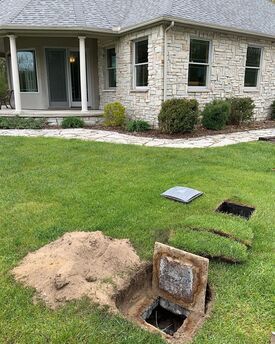Inspect.We recommend homeowners be proactive and inspect their septic systems. Inspections can notify you of existing problems with your septic system. Frequently we find the systems are in good working condition. Problems, if there are any, usually only involve minor repairs that can be easily corrected before they become an issue.
|
SEPTIC SYSTEM INSPECTIONS
|
A septic system inspection is one of those home maintenance tasks that you might put off, and then put off some more. Because septics exist underground in the backyard, they are often out of sight, thus out of mind. But letting it go too many flushes without an inspection can result in some major problems if the system fails.
Plus, septic system inspections are also required if you plan to sell your home. Even if you don't know if you're going to sell, keeping your septic system in good condition will save you thousands of dollars in repairs if anything does go wrong. |
|
REAL ESTATE / MORTGAGE INSPECTIONS
Knowing instead of guessing is a whole lot better when dealing with things under the ground. Our investigative services include not only locating where the septic tank is but also running water into the leach field to make sure it flows as it should. Septic inspections reveal what condition your system is in. We perform a septic system inspection which includes finding the septic tank, digging up the distribution box and, confirming all parts of the septic system are functioning properly.
|
HOW OFTEN SHOULD YOU GET YOUR SEPTIC SYSTEM INSPECTED?
A homeowner should get a septic system inspection every three years.
Here's a dose of reality: Most homeowners never get their septic systems inspected unless there is a notable issue.
But that means homeowners get an inspection only when issues that may signal big trouble arise, such as when the toilet backs up, water takes too long to drain, or there's an actual septic system leakage.
The benefit of doing an inspection every three years is to avoid major problems like these.
The three-year mark is also the maximum amount of time you should let your septic system go without being pumped out.
A problem caught at inspection can save you from having to replace the entire septic system (read: shell out a ton of money).
It's especially important to keep your septic system in good shape if you plan on selling. During closing, a certified inspection will be performed and you don't want any last-minute surprises.
Here's a dose of reality: Most homeowners never get their septic systems inspected unless there is a notable issue.
But that means homeowners get an inspection only when issues that may signal big trouble arise, such as when the toilet backs up, water takes too long to drain, or there's an actual septic system leakage.
The benefit of doing an inspection every three years is to avoid major problems like these.
The three-year mark is also the maximum amount of time you should let your septic system go without being pumped out.
A problem caught at inspection can save you from having to replace the entire septic system (read: shell out a ton of money).
It's especially important to keep your septic system in good shape if you plan on selling. During closing, a certified inspection will be performed and you don't want any last-minute surprises.
MSS | MASTIN SITE SERVICES provides detailed septic inspections and promptly delivers a PDF report to your email.
How we do it.Septic Tank
Locate tank, remove the lid to do a visual check on condition and components found. Gravity flow test Verify pipes from house are clear and functioning properly, Access Riser Installation Access Risers installed on tank if requested. (Recommended for ongoing maintenance of tank and effluent filter) Capacity Measurement Indicate tank(s) capacity Leach field Inspection Uncover the distribution box and run water through the system to check condition and detect any problems. Inspection Report We provide an Inspection Report, which includes the results of all tests and locations of any problems or failures. |


